The journalists of Belarus in exile
Belarus is one of the most difficult countries in Europe for independent journalists to work in. Since the rigged presidential election in 2020, the journalists have been a target for the regime and at least 300 journalists have been forced into exile. Now they are struggling to cover the news in their homeland from a distance.
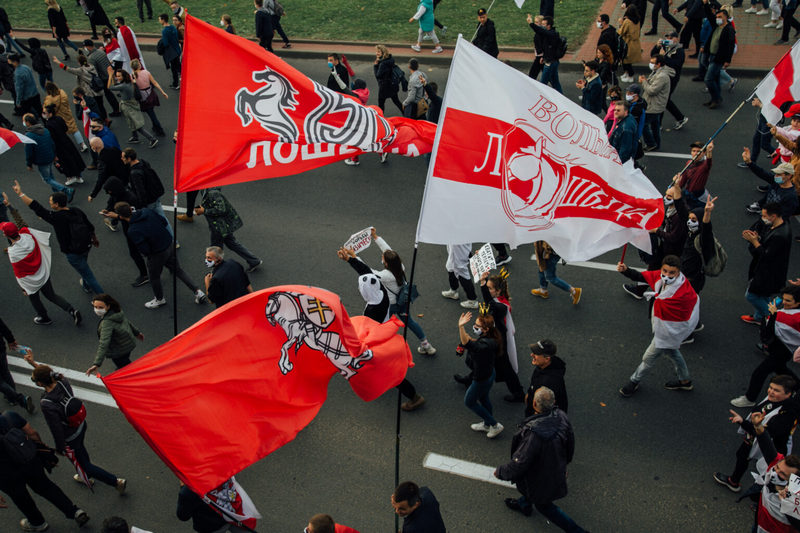
– I came here to Warsaw only with a small backpack. I didn’t even bring my computer, my camera or my hard drives because it was like a symbol of my return, says journalist Tanya Kapitonova.
What will the consequences be when journalists are forced to leave their country and – in the worst case – their profession?
Reporters Without Borders Sweden’s report has been produced in collaboration with the independent journalists’s association Belarusian association of journalists (BAJ). The report describes the situation of the exile journalists, who continue to do their work and make sure that the voices from and about Belarus will not be silenced.
PROLOGUE
While bombs are falling on Ukraine and journalists are shot, kidnapped, tortured and fleeing the brutal repression in neighboring Russia and Belarus continues – which along with Turkey – are two of Europe’s most problematic countries for journalists to work in.
Reporters Without Borders has been able to mobilize quickly in support of our Ukrainian colleagues. Through donations from members, the public and large donors, we have bought protective equipment, first aid kits and satellite phones, opened a press center in the city of Lviv and established contacts to assist journalists forced to flee.
The support for vulnerable journalists in Belarus and Russia has not nearly been at the same level in a Swedish context. When the first reports of increasing abuse of press freedom and attacks on journalists in Belarus came in the spring of 2020, ahead of the election the same year, few reacted.
Thanks to our partner organization, Belarus Association of Journalists, Reporters Without Borders was able to be vigilant, disseminate information and condemn the situation in the country. When the so-called election was a fact and the attacks on free and independent media were systematized, we took to the streets.
During the period 2020 to 2021, more than 600 journalists have been arrested and together they have spent more than 10 000 days in prison. In August 2021 Reporters Without Borders and the World Organization Against Torture published a report on how journalists were subjected to torture and violence.
From August 2020 to October 2021, 300 journalists had to leave Belarus. This report, which was initiated before the outbreak of the war in Ukraine, is about these journalists and points to several of the challenges now facing those journalists fleeing Ukraine and Russia as well.
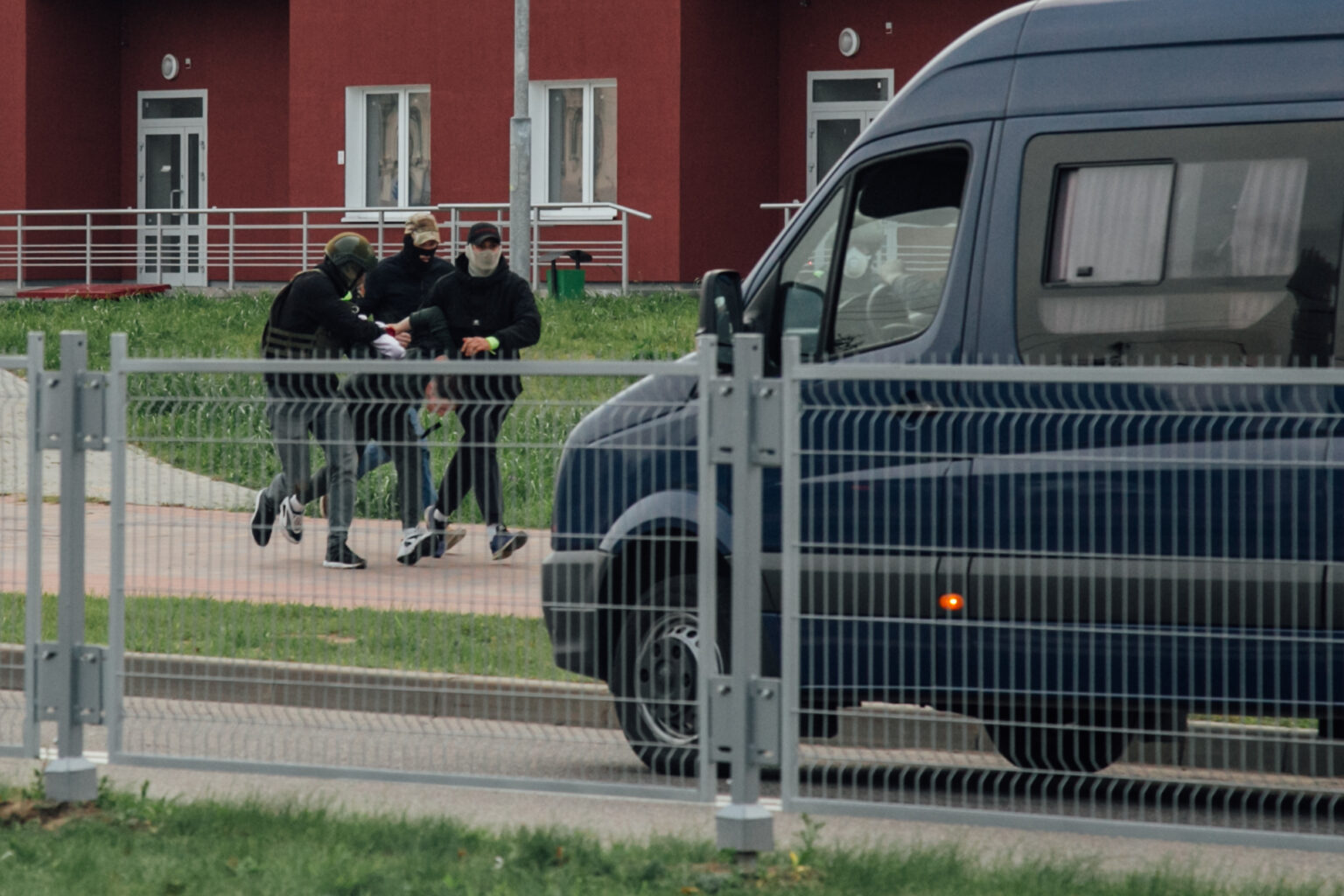
Sweden and other EU countries should create structures to be able to receive journalists, not only from Belarus but also from Ukraine and Russia and give them the prerequisites to continue reporting on their home countries even from exile.
Reporters Without Borders has for this purpose started the fund JX Fund, from which both individual journalists and media houses can apply for funding.
Otherwise, independent journalism in Eastern Europe will be silenced and press freedom will be completely extinguished.
Erik Halkjaer, president of Reporters Without Borders Sweden.
The following is an attempt to portray the situation for the independent journalists and media representatives who have left Belarus.
300 That many independent journalists were forced to leave Belarus from August 2020 to the end of October 2021.
Source: BAJ
The report is based on in-depth interviews with 12 exile journalists from Belarus. One of the journalists is anonymized for security reasons. For the same reason, we have also omitted information about which media some of them work for and where they are based. The report is also based on statistics and a survey from the Belarusian Association of Journalists, which was dissolved by the Belarusian authorities in August 2021. The statistics available are small and limited and it is a challenge that it can not be compared with any other reliable statistics.
According to BAJ, 300 independent journalists and media representatives were forced to leave the country from August 2020 to October 2021. At the same time the number might in fact be even larger since journalists have gone underground or do not have a fixed location. Due to the war in Ukraine several of the journalists who sought refuge there have been forced to flee a second time.
A COUNTRY DIFFICULT TO COVER
Before the election, it was just hard. Time to time we felt this pressure, but working as a journalist was still something you could do. But after the election, it was like a war. When I left home in the morning, I didn’t know if I would see my daughter or my husband again.
Maria Gritz, reporter at Belsat TV, now in exile in Poland.
On August 9th, 2020, the results of the rigged presidential election in Belarus are announced. The incumbent president Aleksandr Lukashenko wins the election with more than 80 percent of the votes.
Both before but especially after the election, massive protests erupt and thousands and thousands of people gather in several cities, among others in the capital Minsk. President Lukashenko strikes back. Hard. With water cannons, tear gas and rubber bullets.
Public interest is great and media coverage massive, but for many of the independent journalists who report from the demonstrations, the blue press vest, which previously provided a certain amount of protection, will be the opposite instead.
The journalists now become a target for security forces.
FACTS: BELARUS
Official name
Respublika Belarus/Republic of BelarusConstitution
republic, unitary stateHead of state
president Aleksandr Lukashenko (1994 –)Head of government
prime minister Roman Golovchenko (2020 –)Population
9 398 861 (2020)Capital and its population
Minsk 2 028 000 (UN estimate 2020)Source: UI/Landguiden
According to statistics from the Belarusian Association of journalists (BAJ) more than 133 serious violations against journalists were recorded between May 8, when the election campaign started, and August 11, 48 hours after the election.
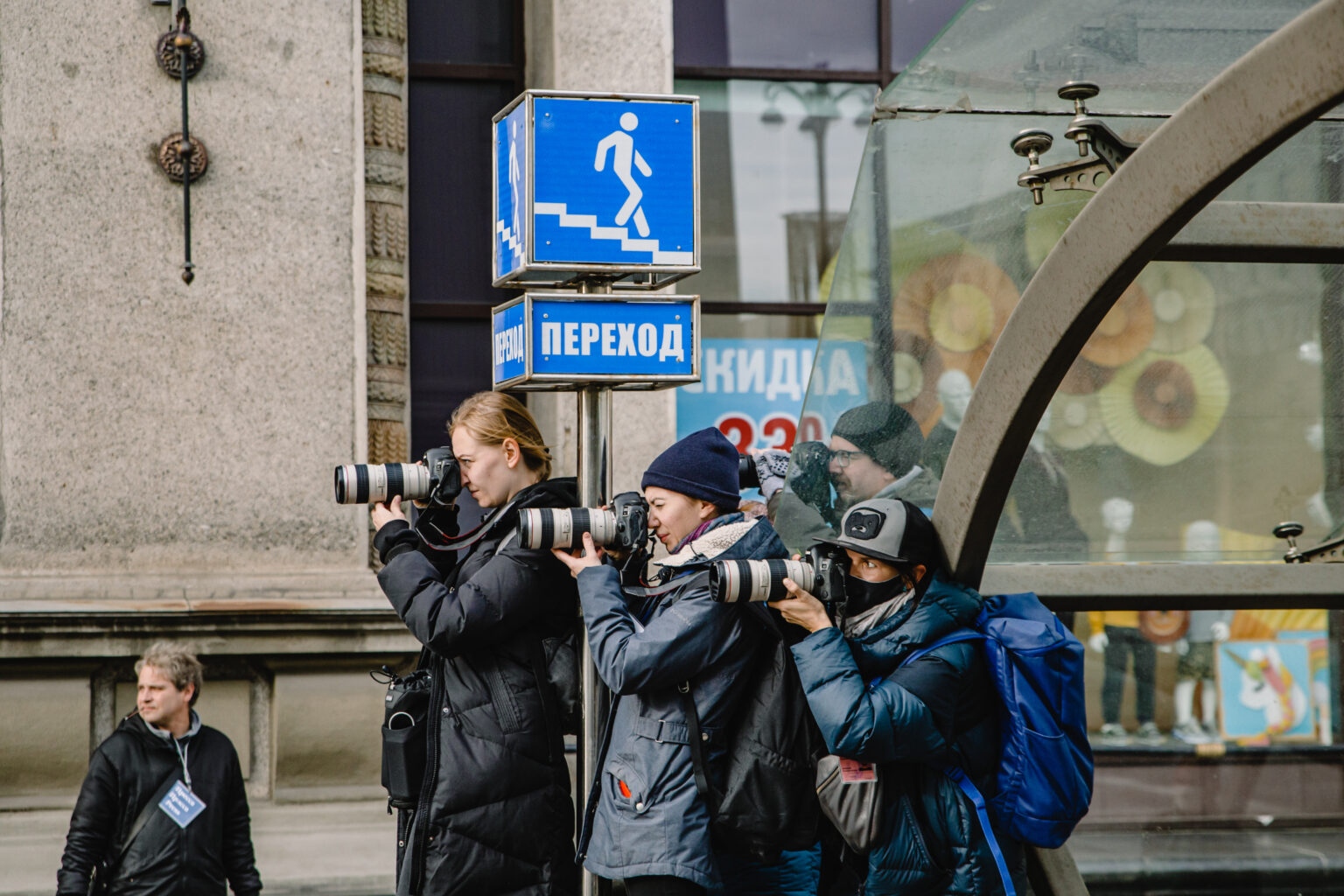
On August 10, 2020, Natallia Lubneuskaja, reporter at the independent Belarusian newspaper Nasha Niva, is present in Minsk to report on the protests.
– Everything was peaceful and people just gathered with placards and banners. We were around ten journalists and most of us wore blue press vests. Suddenly, about twenty men from the security police come running from across the street, says Natallia Lubneuskaja.
The protesters start running and Natallia sees the crowd being shot at by the security forces. Natallia and her colleagues soon decide that it is too risky to stay.
– When we are leaving, I feel something hitting my leg. I look down and see a wound. My colleagues try to help me to get away and some people who have a car parked nearby take me to a hospital.
Natallia Lubneuskaja soon finds out she has been shot by a rubber bullet. She will remain at the hospital for one month. And the shot was no accident, she says.
– We have a recorded film that shows that the shot was definitely aimed at me. It was pn purpose.
This is one of the targeted attacks on Belarus independent journalists registered by the Belarusian Association of Journalists (BAJ).
480 That many arrests of journalists were registered in Belarus in 2020.
Source: BAJ
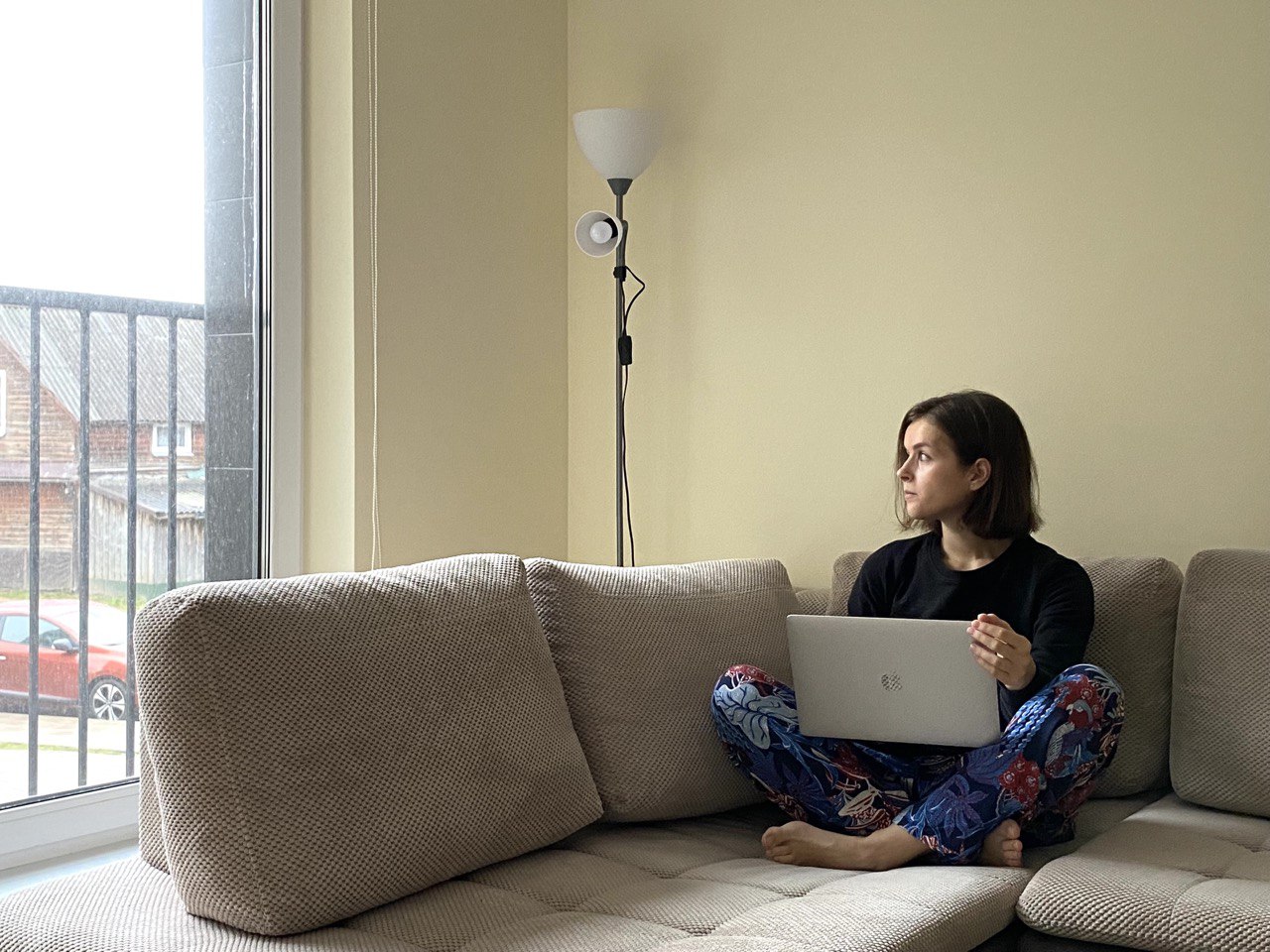
Radio Free Europe journalist Ihar Karnei was arrested and beaten after reporting from a demonstration.
IMPRISONED JOURNALISTS
In Stalin’s time, people used to say something like: ”We just need the guy and we will find a suitable article for him for later”. Maybe it’s the same thing in Belarus now. They can arrest you and then they find a charge. It’s not a problem for them.
Alexander Yaroshevich, Belarusian Investigative Center.
Since 2020 Belarus has plummeted in Reporters Without Borders’ press freedom index. Journalists and bloggers critical of the regime are exposed to threats, violence and arrests. The Internet has been cut off and leading news sites have been blocked. Access to information is severely limited.
In other words, working as an independent journalist in Belarus has never been easy. But in connection with the 2020 election, it has become almost impossible. According to a report by Reporters Without Borders and the World Organization Against Torture, the Belarusian media corps is subject to systematic repression where censorship, fines, threats, revoked press accreditations, raids on both newsrooms and individual journalists’ homes, confiscation of equipment, arrests, extrajudicial trials and even torture have become part of everyday life.
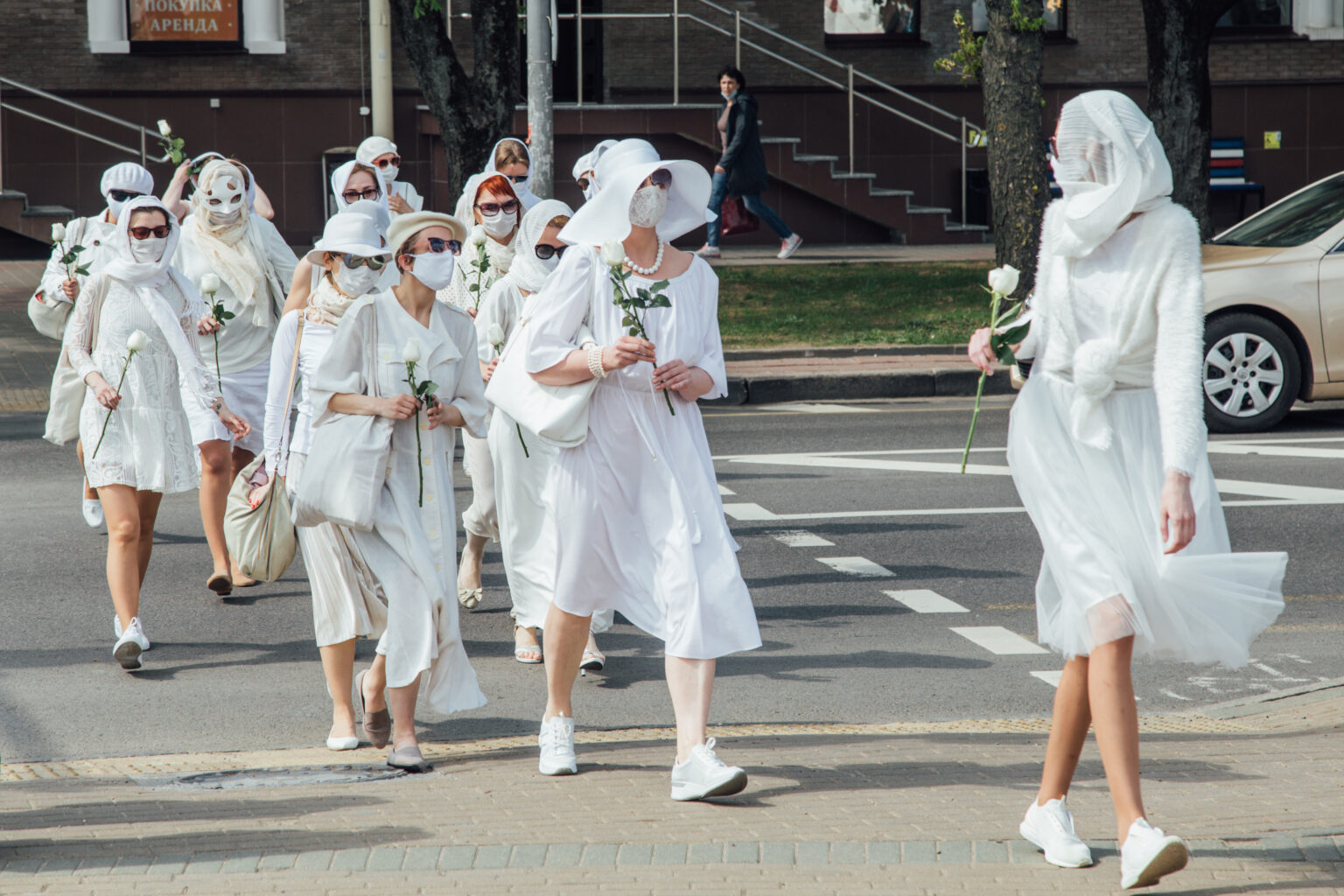
After initially detaining arrested journalists for short periods, the authorities began handing out longer prison sentences in the autumn of 2020. The first victims of the new policy were journalists Daria Chultsova and Katsiaryna Andreyeva of the independent television channel Belsat TV. They were sentenced to two years in prison for broadcasting live during demonstrations. Andreyeva was later on also charged with treason and faces up to 15 years in prison.
The increasing repression has been made possible, among other things, with changes in the law that causes limitations for journalists’ trying to do their job. Among other things, in the mass media law, which for example makes it forbidden to livestream from unauthorized gatherings without permission, and in the law against extremist formations, which makes it forbidden to publish and distribute content that is considered to be extremist. Thus, independent media can be labeled as extremists and publicists and journalists can be sentenced to long prison terms.
But it is not only risky to work as an independent journalist in Belarus, it is also dangerous to read their reports. Anyone who, for example, follows an extremist-labeled Telegram- or Youtube-channel risks imprisonment.
– Any media may be labeled extremist and the authorities do not need a court decision to do so. Police and security services can do this by themselves and they do not always tell the reason for it. Being labeled an extremist media means that everyone who in any way actively participates or contributes to it is considered a criminal, says a journalist who, for security reasons, wants to remain anonymous.
26 That many journalists are imprisoned in Belarus at the moment.
Source: RSF
Currently 28 journalists and media representatives are imprisoned in Belarus (april 2022). Several of those previously arrested testify to difficult conditions, such as overcrowded cells and mental and physical abuse.
One early morning on May 12, 2021, photographer and journalist Tanya Kapitonova covers a demonstration in central Minsk. A group of women dressed in symbolically white clothes and with white flowers in their hands have gathered in the square Kamaroŭski Market where 200 women, just over a year earlier, joined a manifestation against the violence of the regime.
– The protests had lasted for nine months, as long as it takes for a woman to go through a pregnancy and give birth to a child. It was such a symbolic date, says Tanya Kapitonova.
Tanya Kapitonova covers the event and takes several photographs. Then she returns home to write her article.
The next day there is a knock on the door.
– There were five men dressed as civilians. They did not say their names or who they were. They just grabbed me and took me to the police station, says Tanya Kapitonova.
At the police station, Tanya Kapitonova is first put alone in a cold, empty room. Then the interrogators come and pick her up.
– For two, three hours, I was interrogated by three men. They tried to find out if I knew the women at the demonstration and when they understood that I didn’t know them, they started asking for contact information for my editors instead. I didn’t say anything and after three hours they said: Okay, get rid of her. Next day there was a trial on Skype.
A witness who, during the trial, is sitting in the same room as Tanya, claims that he saw her participate in the demonstration and that she wore white clothes and had flowers like the other protesters.
In spite of her denial of having participated in the demonstration, Tanya is sentenced to ten days in prison.
– We were 16 people in a cell intended for two. There were no mattresses, no hygiene products, they did not want to give us the things that our relatives brought with them to us. So for ten days I lived a very ascetic life.

I came here to Warsaw only with a small backpack. I didn’t even bring my computer, my camera or my hard drives because it was like a symbol of my return. I will return.
Journalist and photographer Tanya Kapitonova lives in exile in Warsaw, Poland.
Maryna Zolotova, editor-in-chief of the now extremist-classified news site TUT.by, was detained in Belarus.
There are not many independent journalists still working in Belarus, but they do exist. Exactly how many is hard to know as quite a few have gone underground and write anonymously. Some can continue openly but no longer report on topics that may provoke the regime or criticize those in power.
– All criticism can be regarded as extremism, even a small chat online, and it creates great problems for journalists who would like to speak up. The journalists working from inside the country have this situation of constant pressure. Sometimes they avoid reporting from certain events where they can be taken into custody. So unfortunately there are few voices from within the country that are heard but far from all are silent, says a journalist who wants to remain anonymous.
The journalists who remain in the country are forced to endure raids, arbitrary arrests, threats and violence from the security police. They also live with a constant fear that they or their loved ones will be subjected to reprisals because of their reporting. Many Belarusian journalists therefore see no other solution than leaving the country.

That day the police came to practically all my colleagues from Belsat in different cities around Belarus. I understood that it was a matter of hours, maybe less before they would come to me. Suddenly it became so clear that it was not a bad dream. It was for real. I took some clothes, my daughter’s passport and my own later on and we left the country. We traveled for two days in a row. The journey was extremely tough.
The journalist Maria Gritz works for Belsat TV, classified as extremist. She lived in exile in Ukraine but due to the war she has been forced to flee again, this time to Poland.
LIFE IN EXILE – CHALLENGES AND POSSIBILITIES
What is the situation like for the independent journalists who have left Belarus and sought refuge in other countries? Where are they? What are the challenges, and how is journalism affected by the geographical distance?
Most of the 300 journalists who have left Belarus have settled in countries bordering their own. Most of them went to Poland, Ukraine and Lithuania – countries bordering Belarus. At the same time, the war in Ukraine has forced many journalists who had settled there to flee once again.
Poland 38,4% (56 journalists)
Ukraine 22,6% (33)
Lithuania 15,8% (23)
Georgia 13% (19)
Latvia 0,7 % (1)
Czech Republico 0,7 (1)
Other countries 8,9 % (13)
And life in exile is far from easy, according to a survey conducted by the Belarusian Association of Journalists (BAJ) between October and November 2021 among members of BAJ forced to a life in exile. A total of 140 people answered the survey.
CHALLENGES
-
Legalization in the country of residence 52.1%
-
Searching for housing 26.4%
-
Finding premises for work 10%
-
Job search 39.3%
-
Finding opportunities for medical care and rehabilitation 37.9%
-
Seeking psychological help 20.7%
-
Search for family relocation opportunities 17.9%
-
Search for a circle of colleagues and like-minded people 35.7%
-
Improvement of the language level in the host country 53.6%
-
Search for educational institutions for children 11.4%
Source: Belarusian Association of Journalists.
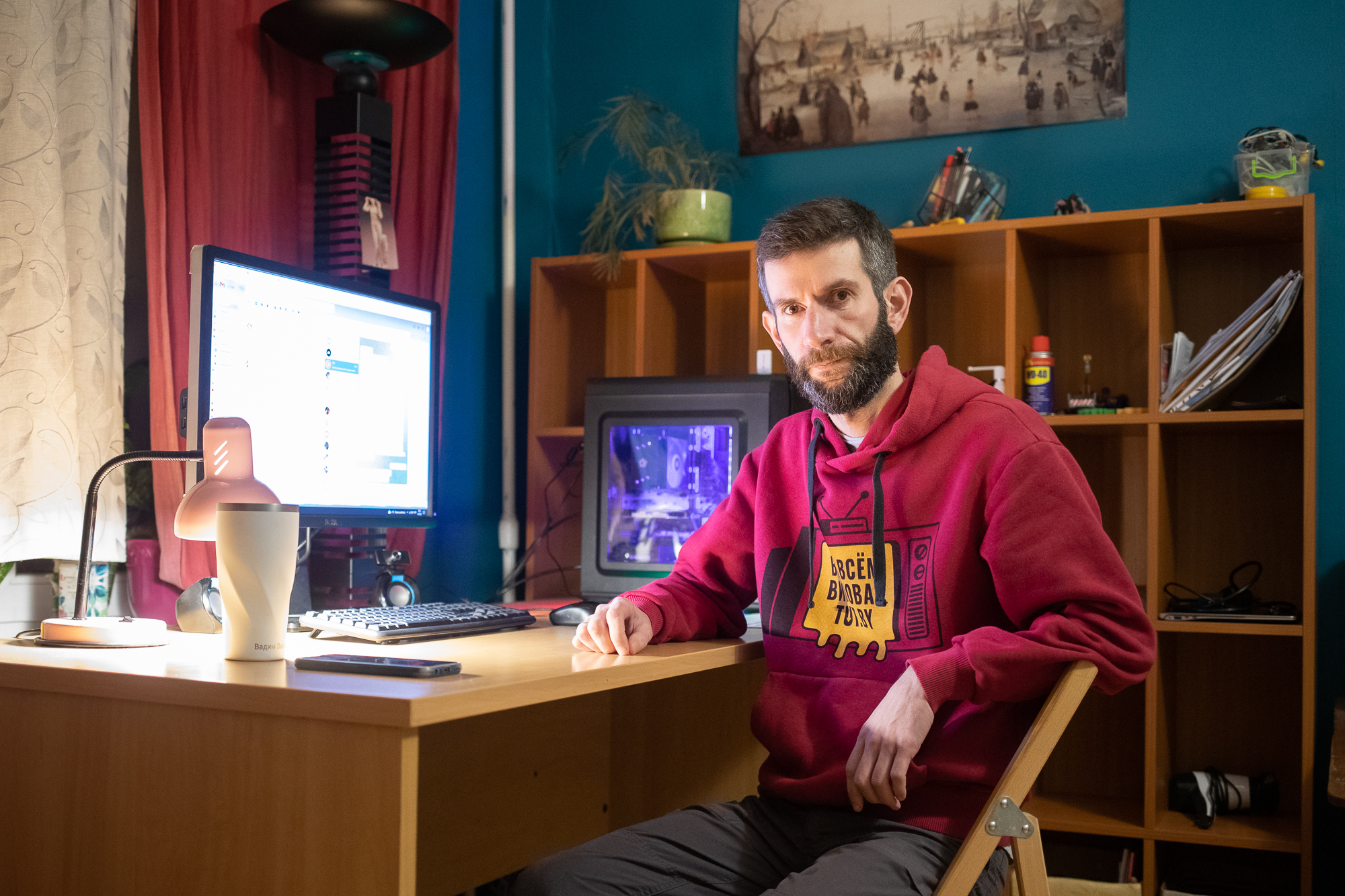
I worked as a photographer for twenty years. In Belarus I had a name, I was famous. Even if I lost my job at the editorial office where I worked, I would easy get a job elsewhere. Abroad, it is an impossible situation and an impossible task to find a job for the competition is so great.
Vadim Zamirovski was forced to give up his job as a photographer after leaving Belarus.
EARNING ONES LIVING
According to a survey by the Belarusian Association of Journalists one of the challenges for journalists in exile is earning a living in the new country. 39 percent of the respondents listed job seeking as a major challenge. Likewise, the lack of a stable income.
The journalists often have to support not only themselves, but also the family in exile or in Belarus. The cost of living is rising as journalists have to restart from scratch.
– People here rent out their apartments unfurnished, so you have to buy everything and it is very expensive. The first night in our rental apartment, my daughter and I had no duvets when we went to sleep. Just my daughter’s little blanket. I was crying all night long because I felt like the most horrible mother in the world because this had been my choice. To put us in this situation, says Maria Gritz, who first lived in exile in Ukraine but was forced to flee again when the war broke out. She now lives in Warsaw, Poland.
The difficult financial situation means that journalists may initially be dependent on financial support, not least to finance new projects. But even if there is support to be had, not everyone knows how to apply for them.
– Most of these people are used to working in the newsroom and having an editor. To start a project on their own is not that easy for everyone. Even if there are possibilities to get access to financing you still have to go through all this paperwork and these are journalists and photographers who may never have done anything like this before. It is a completely new skill you have to learn and not everyone can do it, says Anton Trafimovich, an exile journalist in Warsaw, Poland.
The application process can also involve a security risk.
– First of all, few journalists know that the support exists, and secondly, some are scared that the administrative procedure will involve people from their home country who might get into trouble, or that the channels used for communication are not secure or that information will leak, says a journalist who wishes to remain anonymous.
Some of the journalists may continue to work for the Belarusian media that have moved their newsrooms abroad and for a Belarusian audience. Some journalists are still employed while others enter freelance life.
Tanya Kapitonova, who now lives in Warsaw in Poland, can continue to work for her newsroom from a distance, but now she has new tasks.
– In Belarus, I was creating content. Now I work as an editor and a proofreader. I read all the texts on our website, correct errors and I produce some material for the web. So I do not create anything myself so it feels a bit unusual. I miss the feeling of creating. But at the same time, it is fantastic not to have to worry about being arrested for doing my job, says Tanya Kapitonova.
And not everyone can continue to work as journalists in exile. Things like increased competition in a new labor market, language barriers, none or a limited social network and the fact that the editorial office you worked for has been forced to close down contributes to the difficulty to continue working as a journalist in exile.
Photographers and photojournalists are most vulnerable because they – unlike their writing colleagues – find it difficult to report on their home country from a distance. Some of them therefore have to change their profession.
– I can‘t go out and take photos, cover or make a report about Belarus when I am in Kyiv, says Vadim Zamirovski, who previously worked as a photographer in Minsk.
39 % of respondents in the survey listed job seeking as a challenge.
After many attempts to find a job as a photojournalist in Ukraine, where he moved after leaving Belarus, Vadim Zamirovski was forced to change his career and is now studying to become a motion designer.
– Despite the fact that I have many friends here in Kyiv and that I have tried in every possible way to find a job, I finally had to give up. I loved my job as a photographer. It’s not just a profession but a lifestyle, so for me it was emotionally difficult to change careers. But I have a family. I have a child to support, he says.
Vadim Zamirovski is one of the Belarusian journalists who sought refuge in Ukraine and has been forced to relocate due to the war. Vadim Zamirovski now lives in Vilnius, Litauen.
There are no statistics on how many exile journalists who have left the profession, but it is clear that there will be consequences since the situation in Belarus risks being under-monitored if the number of independent journalists decreases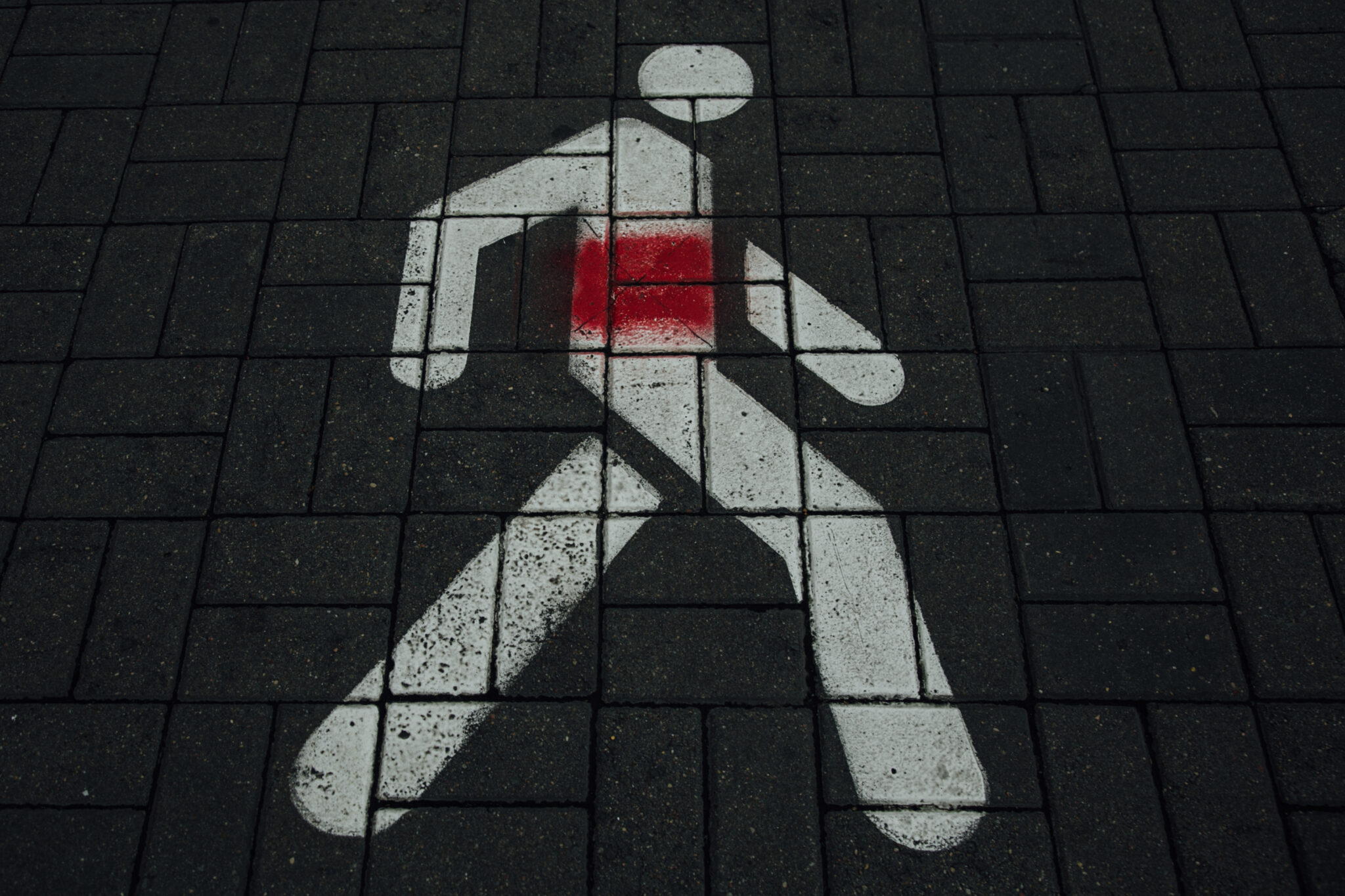
RESIDENCE PERMIT
The most important thing is to be able to stay legally in a country. It is the basic thing for being able to live a normal life.
Vadim Zamirovski, exile journalist in Lituania.
52 percent of the participants in the Belarusian Association of Journalists’ survey from October 2021, stated that the process of visas and residence permits was a big challenge in going into exile.
– It was easier for me to get a residence permit in Poland because, like many other Belarusians, I have Polish roots. It is an advantage that a person with a Polish background can invoke, and that made it easier to get a residence permit, says Ruslan Kulevich, exile journalist in Poland.
Many exile journalists, who need to leave Belarus quickly choose to go to countries where Belarusian citizens do not need a visa and can apply for a residence permit later on. Different visa requirements apply in different countries. In Georgia, for instance, you can stay for a whole year without a visa, in Lithuania a visa is required from day one and in Ukraine a Belarusian citizen can stay for 180 days, after which he or she must leave the country for the same number of days.
Vadim Zamirovski believes that one should make it easier for the refugees from Belarus and share his experiences:
– I had a problem in Ukraine because I did not have an original letter from my editor which showed that I, as a journalist, applied for a residence permit. Since my editor was imprisoned in Belarus, she could not give it to me and I only had a digital copy. The Migration Agency did not want to accept it, says Vadim Zamirovski and continues:
– They did nothing wrong legally, but if you want to help Belarusian refugees, you have to be able to look past these trivialities and understand that the situation is unique.
Also cumbersome bureaucracy, language confusion, lack of information on which routines there are to apply for visa and residence permits can complicate and prolong the asylum process.
52 % of the respondents in the survey thought that the process of visas and residence permits was a challenge.
Several of the journalists testify that the asylum process creates an anxiety that takes time and effort and leaves no space to handle other practical matters that need to be addressed. It also becomes a mental obstacle in the process of integrating in a new country.
– On paper it is quite easy to get protection if you come to Ukraine, as it is a visa-free country, but in reality it is far more complicated. If you have not your legal status settled, you can not think seriously about working, says a journalist who wishes to remain anonymous.

It was no coincidence that I moved here but a thoroughly considered decision. This city reminds me a lot of my hometown. Many Belarusians live here and since I have Polish roots, I know a little Polish. I understand and can make myself understood so I manage.
Ruslan Kulevich, exile journalist in Poland.
LANGUAGE
Belarus has two official languages: Belarusian and Russian. Polish and Ukrainian are also spoken in the country. This may be one reason why exile journalists choose to settle in Ukraine, where a large part of the population speaks Russian, and in Poland.
At the same time, exile journalists state that language confusion leads to problems in the new country. 54 percent of the respondents in the Belarus Association of Journalists’s survey found it difficult to learn a new language or to improve existing language skills to a level that works.
Limited language skills may exclude journalists from the labor market. If they can´t speak English either the opportunities for cooperation with international employers will also be limited, says Ruslan Kulevich, exile journalist in Poland.
54 % Of respondents in the survey thought that language is a challenge.
– You have to know how to speak English. In Lithuania, you manage in Russian. In Poland, those who come from Belarus and can speak Belarusian may be able to get along in Polish as the languages are closely related. But you can go no further without language skills. Germany, Sweden and other countries are not an option to those who don’t speak English. All doors are closed if you cannot communicate, he says.
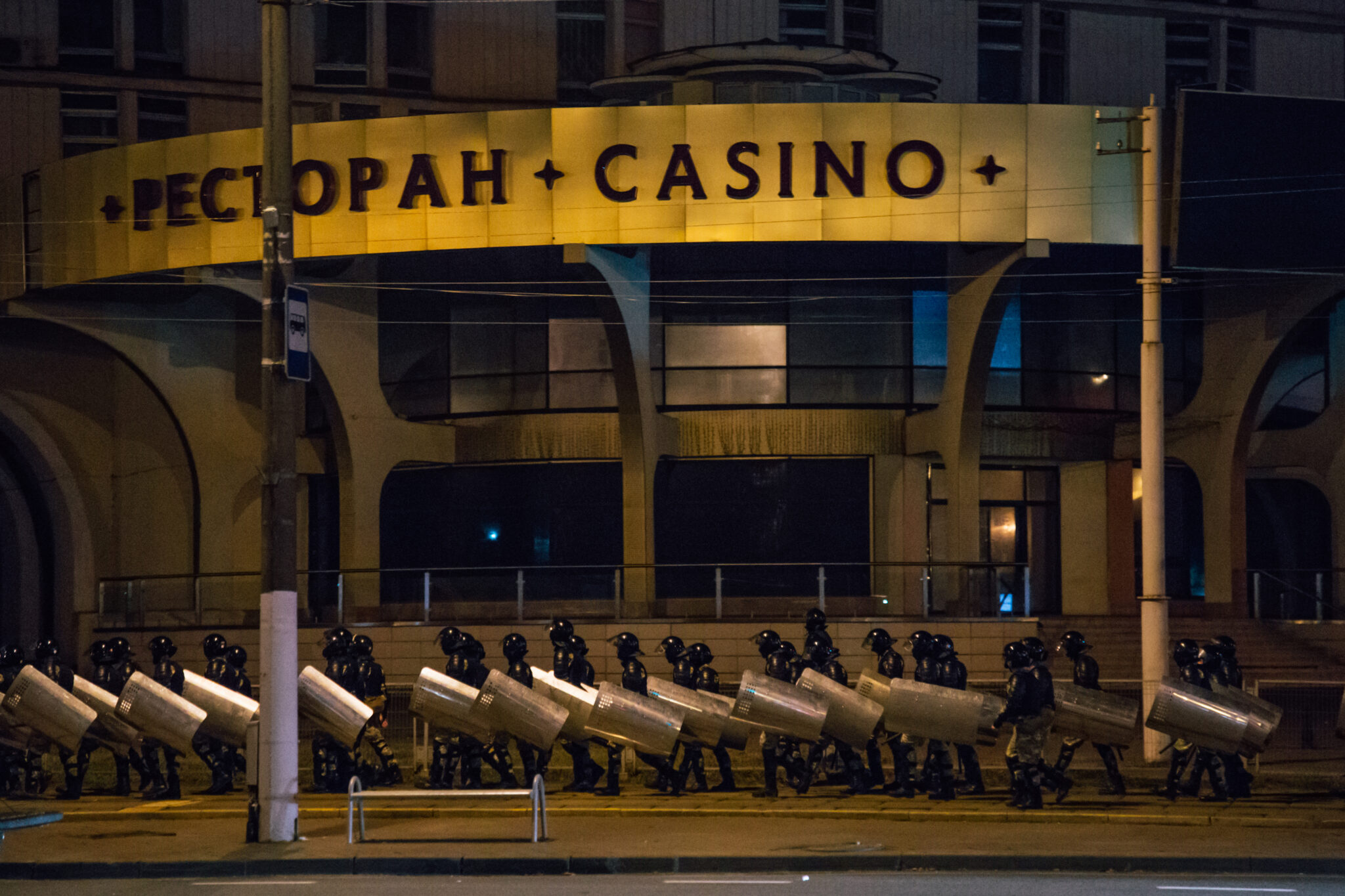
THREATS
.
After the plane with the blogger Raman Pratasevich was forced to make an emergency landing in Belarus, we have become much more wary in matters of personal safety. We don´t reveal where we live and stuff like that. You can easily get here by car and grab a person, put him in the trunk and leave the country without anyone noticing. So we are cautious.
Ruslan Kulevich, exile journalist in Poland.
Several of the journalists interviewed in this report state that they feel safer and more free in their professional role in exile. Some feel that they can now publish their texts – even those critical of the regime – without fear of reprisals.
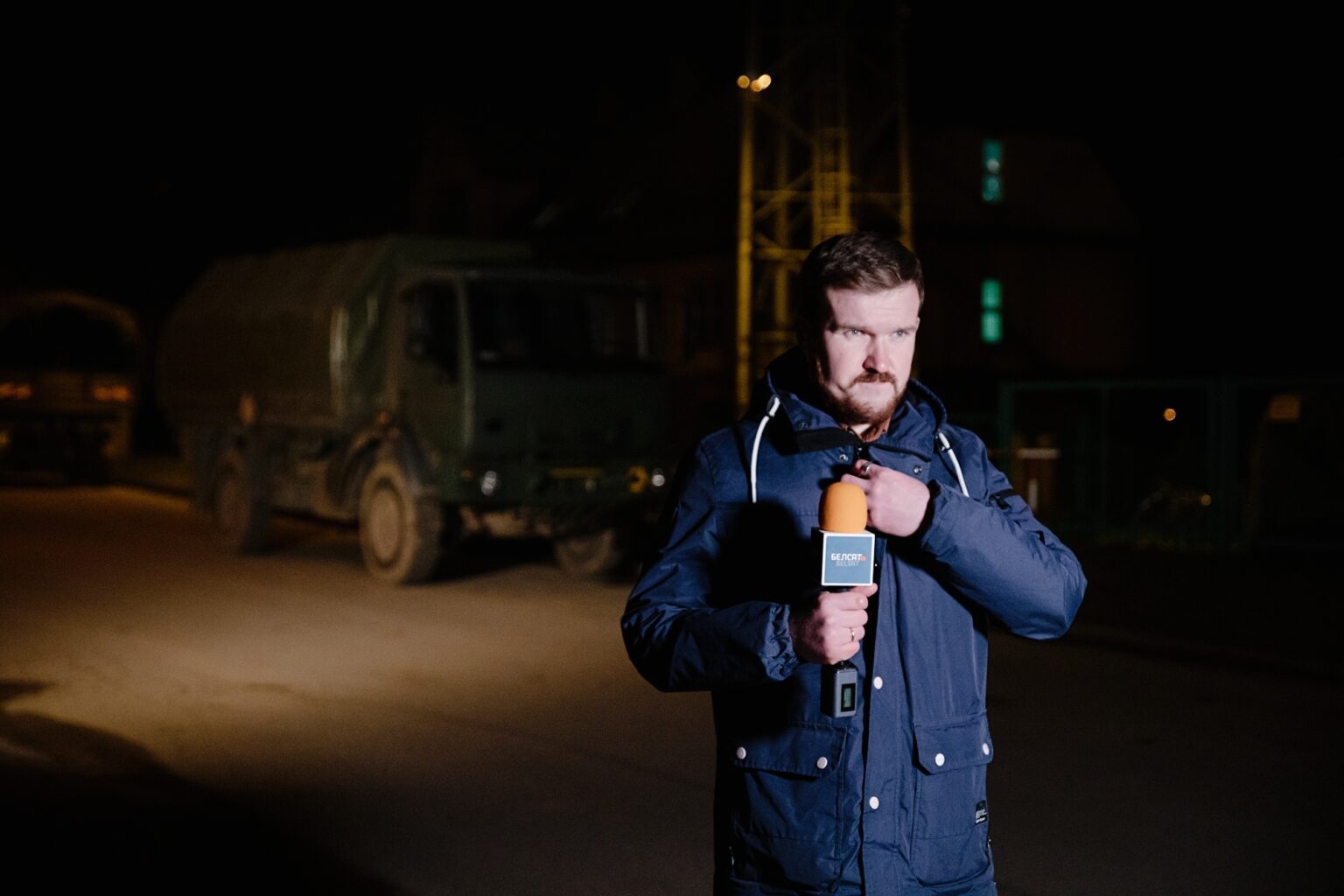
Throughout my career, I have written what I want so I try not to censor myself. If I want to be critical, I am. That’s how it is. Here in Warsaw, I do not think, like some others, that I should be afraid. If I were sitting here being afraid, what then would the people of Belarus do? That’s the main rule of my job, to call things by their proper names.
Journalist Zmicier Mickiewicz, at Belsat TV, on the field.
Others are more wary about what they write.
– I publish articles without my name and most journalists who work for independent media do that. So in this way, I feel safe myself. But at the same time we have to think carefully about what we write because two of our colleagues are in jail. If the police can´t take revenge on us, they can take their revenge on our colleagues instead, says Natallia Lubneuskaja, exile journalist in Lithuania.
It happens that the security police pays a visit to the journalists’ family members in Belarus, threatens them and forces them to endure raids. The fear that the family in Belarus could get into trouble can lead to self-censorship, says Anton Trafimovich, who is now in Warsaw, Poland.
– I haven’t thought about this until recently when I heard about a guy who was an anarchist in Belarus and who then left for Poland. Some time ago, his mother was detained in Belarus because she had raised a bad son and that this was her own fault. All of us journalists immediately felt: “Help, we still have our families in Belarus. Should we now start thinking about what we write and say? ”, says Anton Trafimovich.
And going into exile is far from a guarantee of security. That is totally clear, given the present situation. While producing this report the security situation in Europe has changed drastically, due to Putins ongoing invasion of Ukraine. On February 24, 2022, President Vladimir Puti carries out a full-scale invasion of the neighboring country – a country where many Belarusian journalists have sought refuge. We receive regular reports on cities that are shelled with rocket fire, on rising death tolls and on people fleeing their homes. The anxiety and fear among the Belarusian journalists in Ukraine is great. Three of those interviewed for the report have fled to Lithuania and Poland.
– Belarusian journalists share the same high security risk as their Ukrainian colleagues. Some journalists have fled to western Ukraine, others have left the country. It is a very dramatic situation, says a journalist who wishes to remain anonymous.
Since the escalating repression in Belarus in August 2020, security concerns within the Belarusian journalist corps have increased, both among individual journalists and among the independent newsrooms that have survived.
Above all, the editorial staff invests in educating their journalists in digital security, says exile journalist Aliaksandra Dynko, who first lived in exile in Ukraine but had to flee again.
– When the Internet was blocked and shutdown for three days in Belarus, everyone learned how to use VPN. But now we need to explain to people how to use other digital tools in order to keep and access information they want and to protect themselves. It was not an obligation of the media before but now I think we have to do this for our audience to keep their trust.
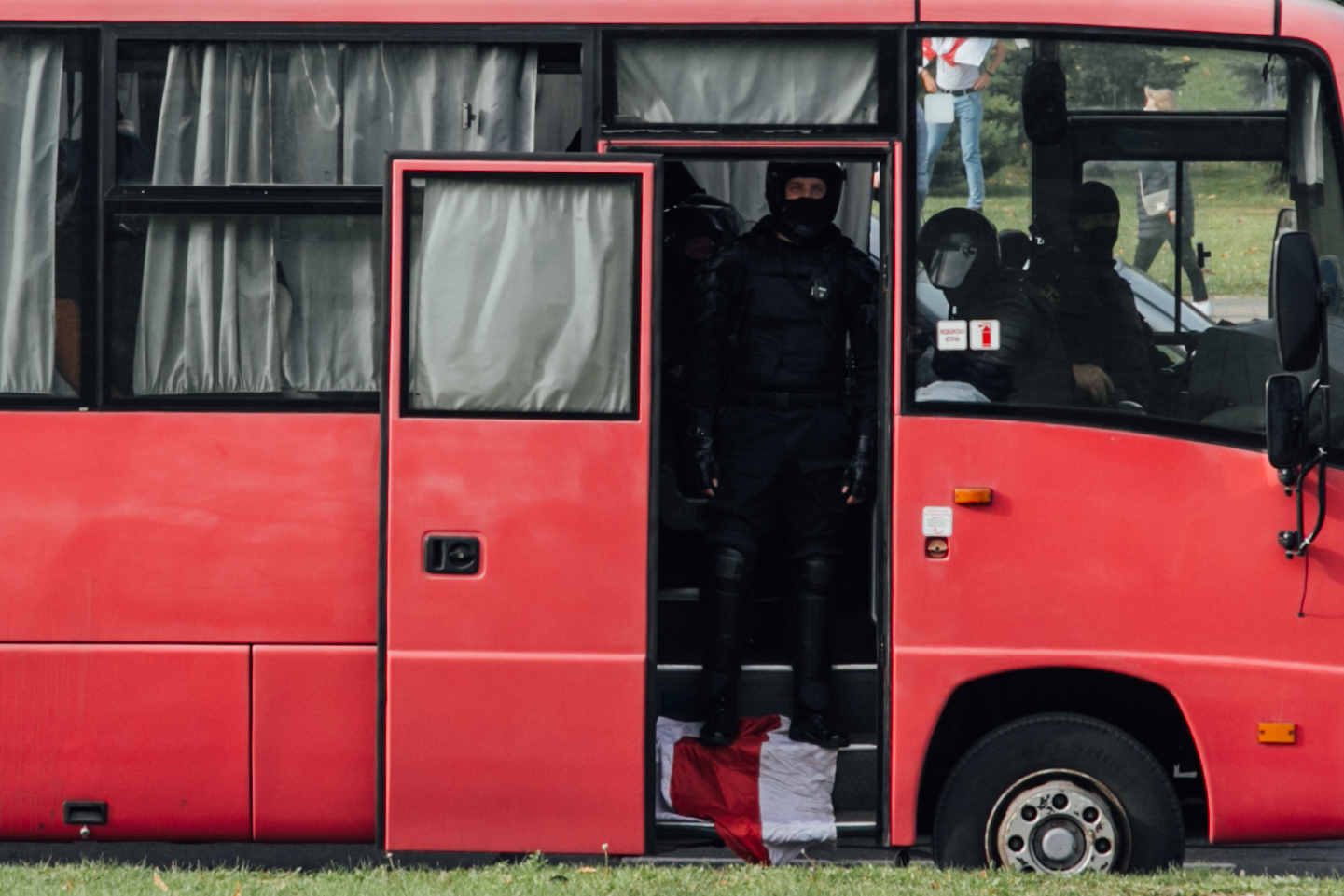
DIVIDED FAMILIES
Belarus is no longer a story about a place but a story about people. Belarus is now everywhere because we Belarusians are everywhere.
Maria Gritz, exile journalist in Poland.
Life in exile can mean that families split up, either in the short or long term, which several of the interviewed journalists highlight as a problem. It’s not always economically possible for the whole family to join the journalist in exile.
18 % of the respondents in the survey stated that finding ways to family relocation was a big challenge.
If the exile journalist, furthermore, is the one who carries the main responsibility for supporting the family, financial problems also arise when he or she moves, for in the beginning the journalist usually has no or little income.
According to the survey conducted by the Belarusian Association of Journalists, 18 percent of the respondents said that finding ways to family relocation was a challenge. The fact that the family remains in Belarus entails a risk that they will be subjected to threats, extortion and retaliation, which could lead to self-censorship by the exiled journalist.
– My husband was very worried when my daughter and I left Belarus. He did not know where we were and during our journey I had no way of connecting with him. You should not contact your family when leaving the country as they can be detained. They can use your family to blackmail you to go back, says Maria Gritz.
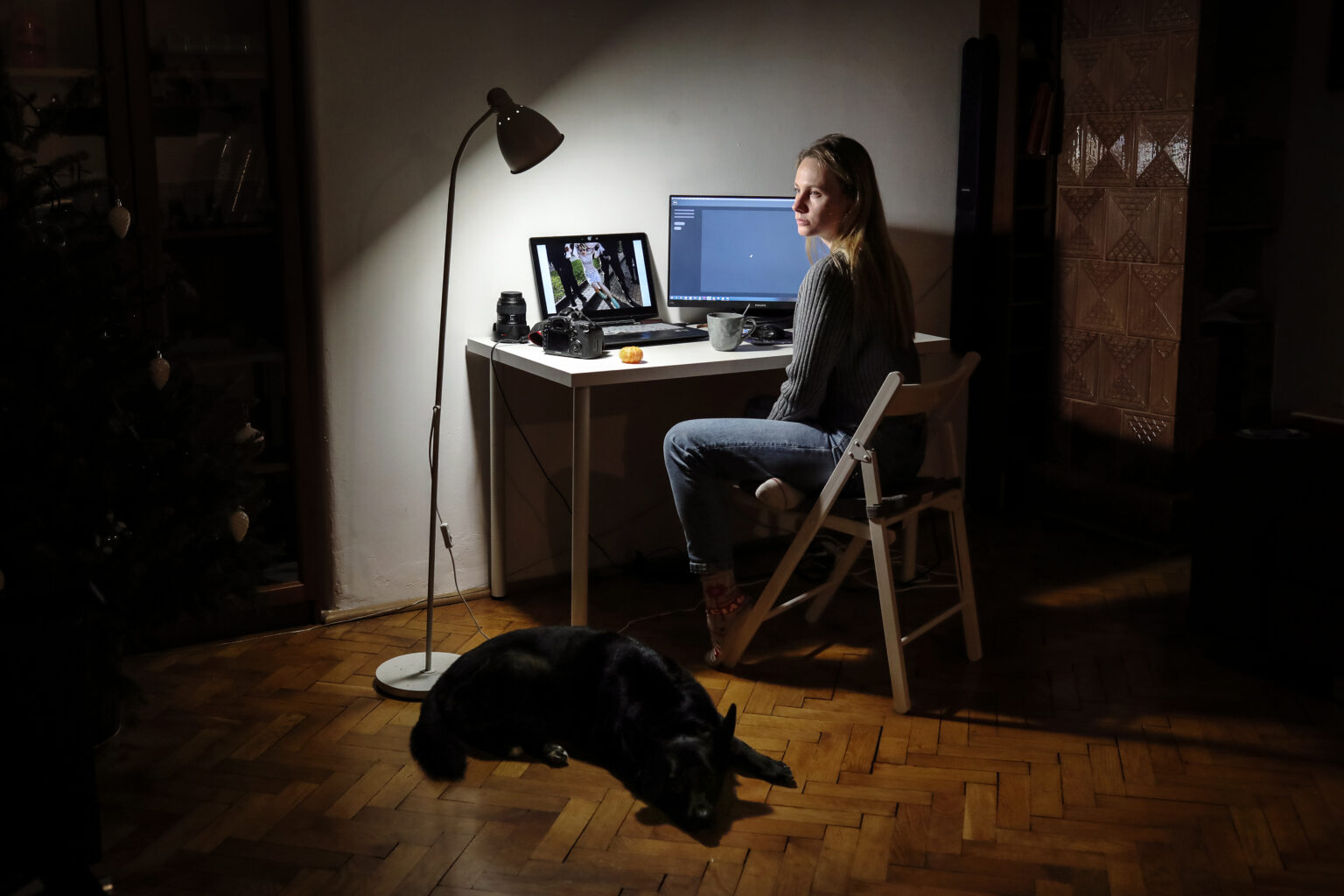
The greatest problem is being deprived of a daily context. Not being able to interact and meet the people who live in your own country, not being able to soak up the atmosphere, what is going on, what people are talking about. It creates some kind of artificial situation where you are alienated from reality. It is very difficult to work outside a context.
Journalist Iryna Arakhovskaya lives in exile in Warsaw, Poland.
CONTEXT
Several of the interviewed journalists say that it feels as if they have been deprived of a context. Some feel isolated, especially those who have left Belarus on their own and do not have their family or an editorial office to support them. They experience that it can be difficult to find a social context. 36 percent of those interviewed in the Belarusian Association of Journalists’ (BAJ) survey finds this challenging.
One of them is journalist Anton Trafimovich, who lives and works as a freelance journalist in the Polish capital Warsaw.
– What I lack here is the spirit of the newsrooms in Belarus. Because many newsrooms were raided and no longer exist, journalists come here on their own. And even if there is a network of journalists here, you are still on your own. There is a lack of a professional community, and thus support, he says.
36 % Of the respondents in the survey consider the lack of a journalistic context as a challenge.
In several of the countries where Belarusian journalists move, such as Poland and Lithuania, there is a large proportion of immigrant Belarusians, but despite this it can be difficult to find a place to meet other exile journalists, especially if you work as a freelance.
According to journalist Hanna Liubakova, who lives in Vilnius, Lithuania, such a context is a must to be able to settle in a new place and to establish collaborations.
– It would be good if there were some kind of media hubs for journalists where we could work, exchange information and create something together. It could lead to collaborations and make us stronger. Even though our newsrooms have been destroyed, we can still do something together, create new projects, says Hanna Liubakova.
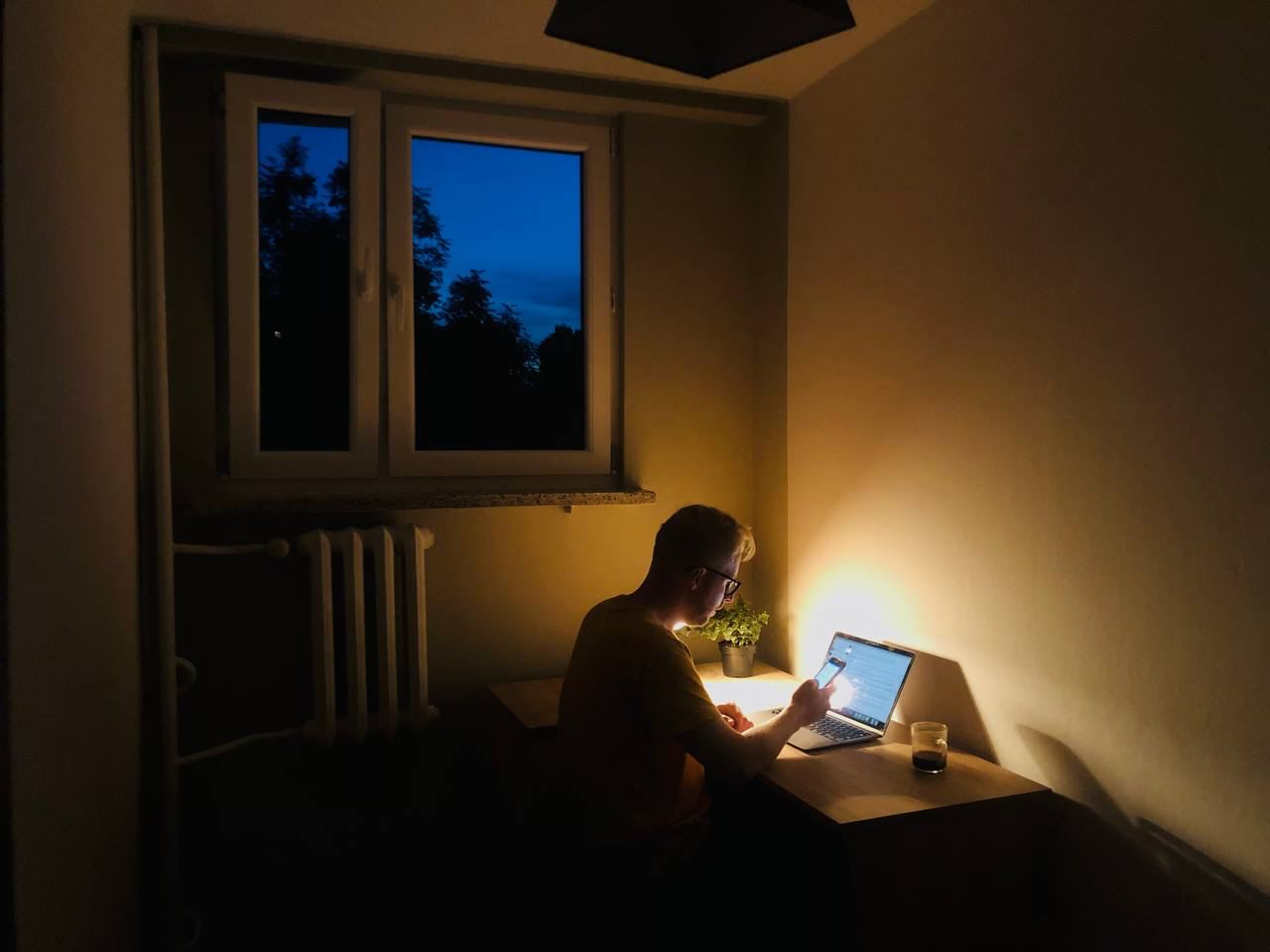
I think all Belarusians, especially journalists, are still experiencing trauma. It is hard to reset yourself even if you went abroad. We still dream about the protests, about the beating, about the police… We are still in the middle of this fight. That’s what makes it so hard, I think.
Anton Trafimovich at his home office in Warsaw, Poland.
TRAUMA AND GUILT
Many exiled journalists suffer from physical and mental trauma, both as a result of having worked as journalists in Belarus with all that it can entail in terms of abuse, threats and arrests, and as a result of fleeing their homeland.
Many times, journalists have to leave the country in a hurry due to an increased threat, fear of reprisals or because they risk being prosecuted – just because they have done their job.
– The most difficult thing is when journalists have to leave Belarus very quickly. Just leave everything behind, with a small bag, not knowing where to go. These people are the ones who are the most vulnerable now. They burn out. So, the need for psychological help is probably the most important thing for everyone right now. They need help and support, and the support must be continuous, not just something they get from time to time, for the crisis is still going on, says a journalist, who wishes to remain anonymous.
Another aspect of the flight is that many journalists find it difficult to accept that they have been forced into exile, says Anton Trafimovich.
– I think there is a huge psychological issue in relocation because it’s hard to realize that you yourself are a refugee. For instance, I met a friend who is a photojournalist and who came to Warsaw a few months ago. She can hardly work or do anything because the only thing she thinks about is that she wants to return to Belarus. She is really frustrated and doesn‘t like her status as a refugee. As for myself and my wife we had a completely different strategy. We moved to Poland, without setting any deadlines or milestones, and we will just live here until we get a clear signal that it is safe to return, he says.
38 % of respondents in the survey considered it difficult to find opportunities for medical care. 21 percent think it is a challenge to find psychological help.
Others don‘t want to see themselves as exiled but consider the move a temporary one.
– I stayed in a hotel for several months because I didn‘t want to look for an apartment. I kind of refused to start living anywhere else. My home is in Belarus. This is my country. And realizing that you cannot go back, that you cannot see your mom or the forest from your window… It is very painful, says exile journalist Hanna Liubakova, who lives in Vilnius, Lithuania.

Several journalists also describe that they feel powerless facing the development in Belarus and guilt for leaving the country and their colleagues behind, something that consumes them. Exile journalist Tanya Kapitonova punished herself for a long time for having fled.
– I asked myself every day: Why did I leave? Was it because of paranoia or intuition? That was the most difficult thing for me. But finally, I understood that I should not victimize myself because it wouldn’t make anything better for me or my work.
Tanya Kapitonova felt that by leaving Belarus, she let her colleagues down and the fear of reprisals makes her, despite her being in Poland, afraid of being as critical as she would like.
– I try not to be this hero at the front line, the one who reveals the truth and is ready to do anything, because I can’t. I would like to say something but I’m not ready. I find myself in a situation where my voice is stolen once more.This constant feeling that I can do more but can’t manage it, it destroys me, says Tanya Kapitonova.
It is clear that the journalist’s experiences are leaving traces, both physically and mentally, and they are seeking medical and psychological help in exile to be able to move on.
At the same time, 38 percent of the respondents in the Belarusian Association of Journalists´ (BAJ) survey consider it difficult to find opportunities for medical care and rehabilitation, and 21 percent think it is a challenge to find psychological help.
Another important thing that they highlight is the opportunity to take a break from the, in many cases, heavy responsibility of everyday life in exile and gain strength to be able to continue working. This type of retreat for both exile journalists and those in Belarus is something that the Belarusian Association of Journalists has arranged.
– We photojournalists had a very nice experience at a residence for photographers near the Baltic Sea in Poland. For two days we worked on our photo archives and created new projects. I remember that it gave us strength, to breathe fresh air and look at the sea, and that it was very inspiring, says Tanya Kapitonova.
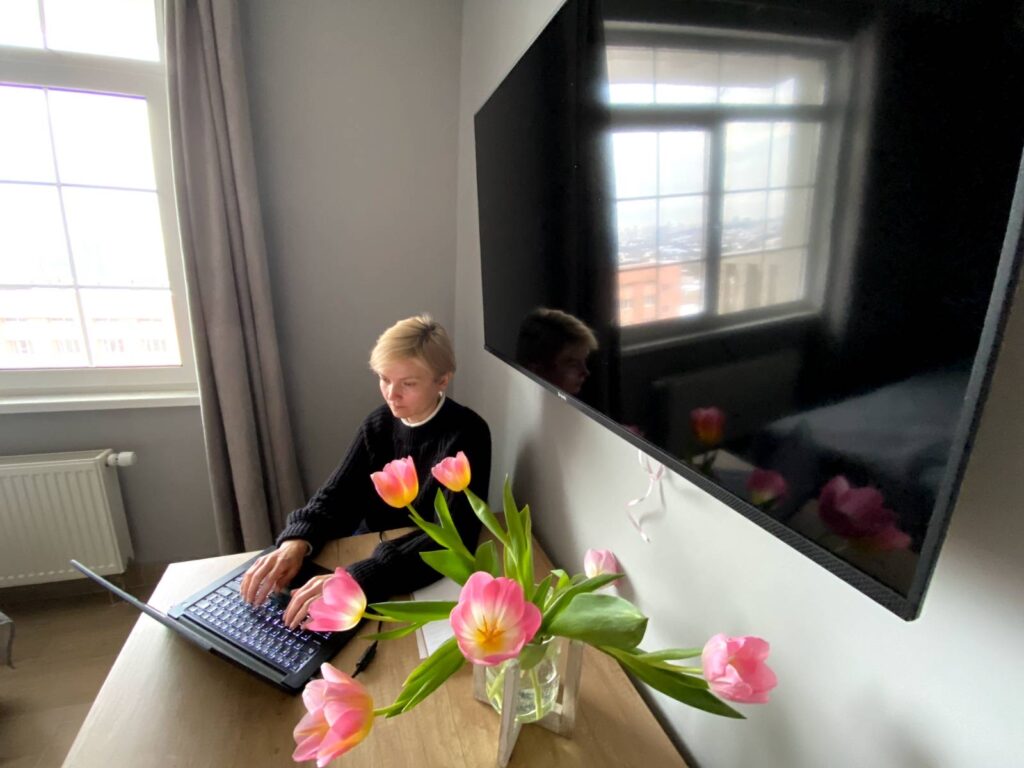
We do not have access to the field. We can not see what is happening with our own eyes, which was the very essence of my job when I worked in Belarus. It was my principle to be out in the field and talk to people in person and just write things that I myself witnessed. Now it’s impossible.
Aliaksandra Dynko first lived in exile in Kyiv, Ukraine but has been forced to flee once more.
JOURNALISM IN EXILE – ANONYMITY, TRUST AND INNOVATION
President Aleksandr Lukashenko’s systematic crackdown on independent journalists Belarus has created a new, more or less thoroughly digital media landscape and new conditions for independent journalists to report on their homeland – both in Belarus and in exile.
This also affects the journalistic product: more anonymous sources, difficulties in verifying information, self-censorship and less journalistic transparency due to an increased need for source protection, are some of the changes highlighted by the exile journalists. But after all, journalists manage to get around this and find new, innovative solutions to cover their homeland. An evolving media landscape requires new strategies, says exile journalist Zmicier Mickiewicz, who lives in Warsaw, Poland.
– At the moment, the main instrument for democracy is the encrypted app Telegram, which makes it possible not only to disseminate but also to share and obtain information anonymously without leaving a trace. So it’s very easy for people to send data. You can take a picture, send it and Telegram kills all metadata. Even if the police take your phone, it is impossible to find out who sent the picture. That’s how it works.
Many exile journalists continue to work for the Belarusian media and for a Belarusian audience. These are the media that had the opportunity and the finances to move their newsrooms abroad. But the conditions for reporting on Belarus from a distance are different.
The biggest change, of course, is that exile journalists cannot cover what is happening from the ground in Belarus. They therefore work closely with their colleagues who are still in the country and with their readers who send pictures, videos and updates via encrypted apps. In this way, a type of citizen journalism has taken shape in Belarus, says Zmicier Mickiewicz.
– The best journalists are still in the country. Everyone who has a smartphone with a camera in a way can be a journalist, so it is impossible to hide anything.
But delivering information to independent media is far from safe. As a subscriber to a Telegram channel linked to one of the media, branded as extremist by the authorities, you can be sentenced to imprisonment for up to seven years. And the stronger the pressure is from the authorities, the more journalists and the belarusian people have to know about cyber security.
Despite the risks, the audience continues to provide information and support independent media, says Aliaksandra Dynko.
– Some weeks ago, our Telegram channel was hacked by the special forces in Belarus. It was violently hacked because they arrested one of the administrators of the account and it was in control of the special forces for ten minutes. They managed to put out an announcement to the audience saying they know who subscribed to the channel and that they would be punished. When we later gained control of the account, we had lost less than five percent of our audience, she says.
According to Aliaksandra Dynko this proves that the people of Belarus have more confidence in independent media now than ever before.
– It means a lot to me because I understand that despite the risk of repression, arrests and other consequences people continue to subscribe to extremist-branded media. This means that our work means a lot to our audience and that we must continue.
In general, it is not as risky for exiled Belarusians to give interviews to independent media as for those who live in the country, which is why journalists often talk to Belarusian experts, commentators and the opposition abroad, says Anton Trafimovich.
– There is a category of people who are not afraid to give comments. For instance, relatives of political prisoners who are already in the spotlight and who feel that they have nothing to lose. There are also some experts in Belarus who may consider talking as well, but I don´t know. I think it’s only a matter of time before they might be detained.
But the fear of retaliation has consequences. Aliaksandra Dynko describes it as journalism having entered ”an anonymous era”.
– This is, in many ways, an era of anonymity, since people are afraid to communicate with extremist media. Even experts are afraid to talk to us, since Belarusian authorities see those who work with analysis as a particular threat. It is also an anonymous era in the sense that journalists – for various reasons – fear that their families in Belarus will be prosecuted, she says.
As the journalists’ families in many cases remain in Belarus, there is an indirect threat even though the journalist is in safety in another country. This can lead to self-censorship. The journalist may prefer to opt out of subjects that could provoke Belarusian authorities or they could publish articles anonymously rather than risk exposing the family to potential danger. This also affects the journalistic product.
– All criticism can be considered extremism. Even a small chat can be seen as an extremist group. It creates major problems for those journalists who want to make their voices heard and raise certain social or political issues or report on political events, says one journalist, who wishes to remain anonymous.
13 That many media channels were branded extremist in Belarus in 2021.
At this time when exile journalists are dependent on secondary information, fact checking is being put to the test – now more than ever before. And there are those who exploit that vulnerability for their own purposes, says Aliaksandra Dynko.
– There were cases where Belarusian security services, or even other enthusiasts, have produced lots of fake news trying to make independent media reporting on them. We have to put much more effort into finding out if the information we receive is true or not.
This puts higher demands on the editorial staff in the form of time, knowledge and resources.
– We go through a lot of training on how to increase our fact checking-skills and we use many different tools. We make fact-checks on our videos and photos via metadata trying to understand whether they are true or not. We also check all the news we collect via social media and networks. We need to confirm the information with several other sources. It takes a lot more time but we need to do this in order to maintain the trust we have from our audience, says Aliaksandra Dynko.
Even if the journalists find ways to continue reporting on their home country, there are certain stories and topics that might end up in media-shadow, says Natallia Lubneuskaja.
We have our audience in Belarus who help us with some photos or who can talk to us and to tell what has happened. So it’s a great help for us abroad. Yes. And maybe because of covid, even a year before, we make a lot of interviews online because it wasn’t safe to meet in life. Yes. So now it’s not a problem to make an interview online because people, it’s not something new, it’s OK for them and almost everyone have Telegram or Zoom and maybe it’s the one plus of covid for this situation that we learned how to do the articles without meeting in life. Mm-Hmm. So but the problem, of course, that we can’t write about some themes, some topics, because if we were in the city or in the country we can go to a place or something else and to see if it is the truth of what we heard, or not. Now sometimes it’s difficult, even with the help of audience, so we are to … Well we are not to do some topics because we’re not sure that the news we hold are objective and the truth. Mm-Hmm. [178.1s]
– We have our audience in Belarus who can tell us what is happening and it is a great help for us abroad. Because of covid, we already did a lot of interviews online, since it wasn´t safe to meet irl, so this is not a problem now. Almost everyone has Telegram or Zoom and we have learned how to write articles without meeting face to face. But the problem is that we can´t write about certain topics because we are not there. It is difficult, especially if it is something very local, in a city where we do not have as large an audience. We can’t report on certain topics since we’re not sure what is objective and true, says Natallia Lubneuskaja and continues:
– Now that people are afraid to talk to independent media, we also have fewer stories about people. Not about politics, but about life and things like that. People are afraid that the attention would be bad for them.
Despite this, journalists continue to work to ensure that the voices from within Belarus are not silenced. It is our job to make sure that they have all the prerequisites they need to do their job.
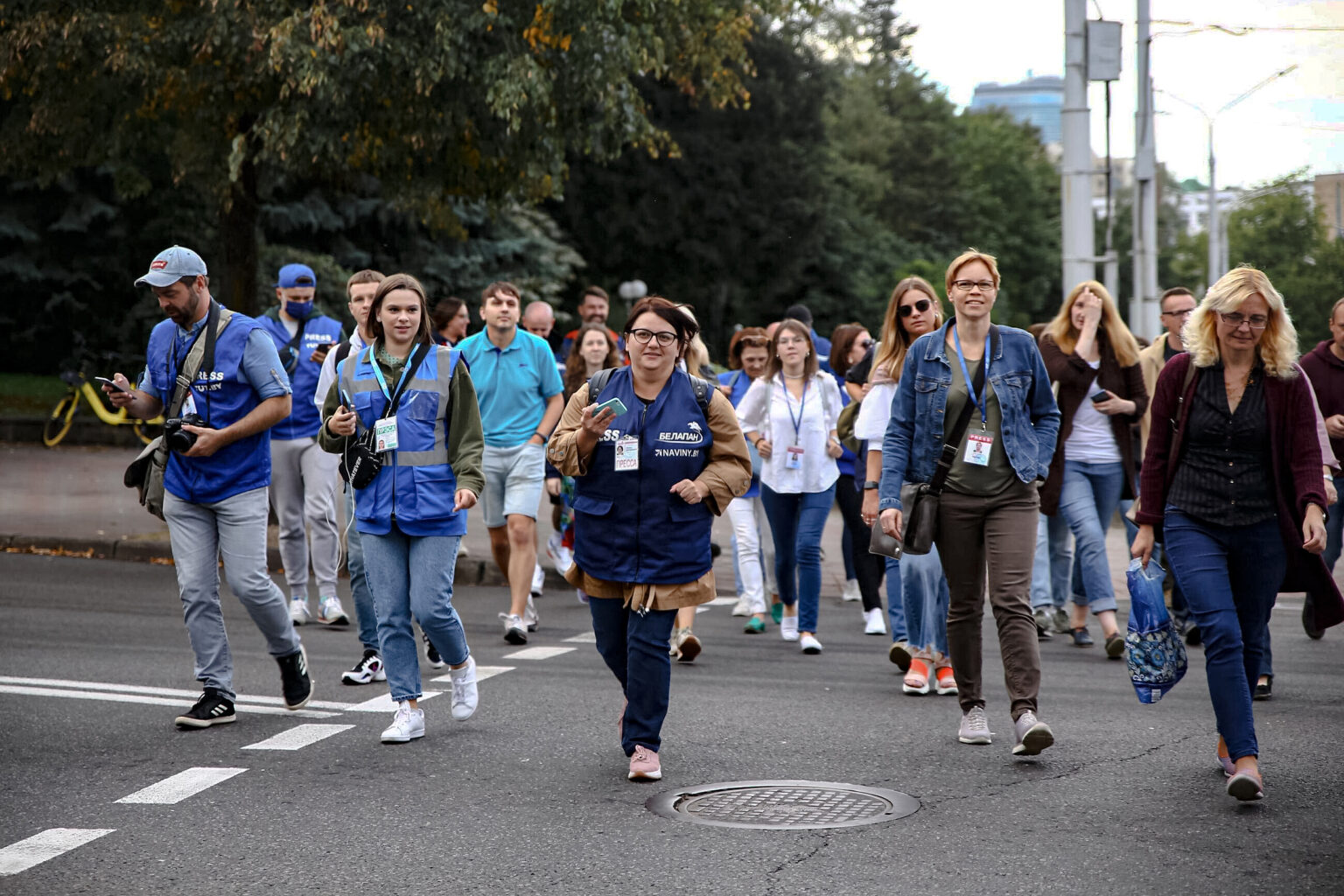
THE RIGHT TO INFORMATION
The situation shows that journalists can and will continue to work. You can imprison us, you can block all our sites. We will create new ones. We will move and continue working. We are like the phoenix, we‘ll be born again.
Hanna Liubakova, exile journalist in Vilnius, Lithuania.
Before the election in August 2020, according to the Belarusian Association of Journalists, there were about 4 000 journalists and media representatives in Belarus – a country with a population of just over 9.4 million. This can be compared with Sweden, which in 2019 had just over 10 300 journalists on a population of just over 10.4 million. In addition, 2 000 of these 4 000 belarusian journalists were employed by state-controlled media, 1 300 are independent and members of BAJ.
The Belarusian independent journalists corps has a major responsibility in providing the people of Belarus with impartial, independent information.
Since the repression escalated in the summer of 2020, at least 300 of these 2 000 independent journalists have left Belarus. They have left their homeland, their colleagues and families due to threats, censorship, arbitrary arrests, torture, extrajudicial prosecutions and violence.
This is a very dangerous development.
Working as an independent journalist in Belarus today is very difficult. There are those who continue to fight for free speech – putting their own and their families’ lives at risk. The harder Lukashenko’s snare is tightened on the local journalist corps, the greater the journalists’ determination to continue doing their jobs seems to become. Against all odds, they are finding ways to guard Belarus and we need to do everything we can to support them.
Belarusian journalists face major challenges, even in exile. Since the outbreak of the war in Ukraine, after this report was initiated, Aliaksandra Dynko, Maria Gritz and Vadim Zamirovski, have been forced to flee once more. Again, they need to restart. This is partly about dealing with practical tasks such as housing, residence permits and looking for work opportunities. To rebuild their lives again, from scratch. It is also about processing eventual psychological trauma from the escape and physical trauma that might have arisen after assault, torture and detains in Belarus.
Not all journalists leaving Belarus can continue to work as journalists. Some switch to combining their journalistic activities with other types of assignments. Others are forced to retrain and change careers. This is also a dangerous development.
If Belarusian journalists leave their profession, we will not only lose talented colleagues, we will also lose the opportunity for transparency. Silenced journalists and media put not only everyone’s right to free and independent news coverage out of play, but it also weakens democracy. When the spotlight falls on the one who abuses their power, the pressure increases and we can make demands. When journalists are prevented from doing their job, this becomes very difficult.
That those in power crack down on independent journalism in order to stifle it is unfortunately nothing new. It is an effective strategy to take control and silence both the people, those who are critical against the regime and the opposition. There is little indication that President Alexander Lukashenko’s grip on Belarus will be released. Rather the opposite. Let us therefore do everything we can so that Belarusian journalists can continue to do their job. Only then, will we increase the pressure on the regime, only then can we make demands.
In Belarus, the struggle for freedom is very visible. It is embodied in the massive protests that swept across the country during the summer of 2020. It is embodied in all the encrypted Telegram messages with information, videos and photos that the Belarusian people send to the reporters of the independent media. It is embodied in the journalists striving to continuously and tirelessly enlighten us about the situation in Belarus, in all ways accessible and from all over the world.
Article 19 of the UN Universal Declaration of Human Rights reads:
”Everyone has the right to freedom of opinion and expression; this right includes freedom to hold opinions without interference and to seek, receive and impart information and ideas through any media and regardless of frontiers.”
Freedom of expression is a human right. Freedom of opinion is a human right. Also independent, impartial information should be a human right. Therefore, we must ensure that the independent journalists can continue to report on Belarus – both within the country and in exile. We must never allow that Belarusian journalists are silenced.
Siri Hill, board member Reporters Without Borders Sweden.
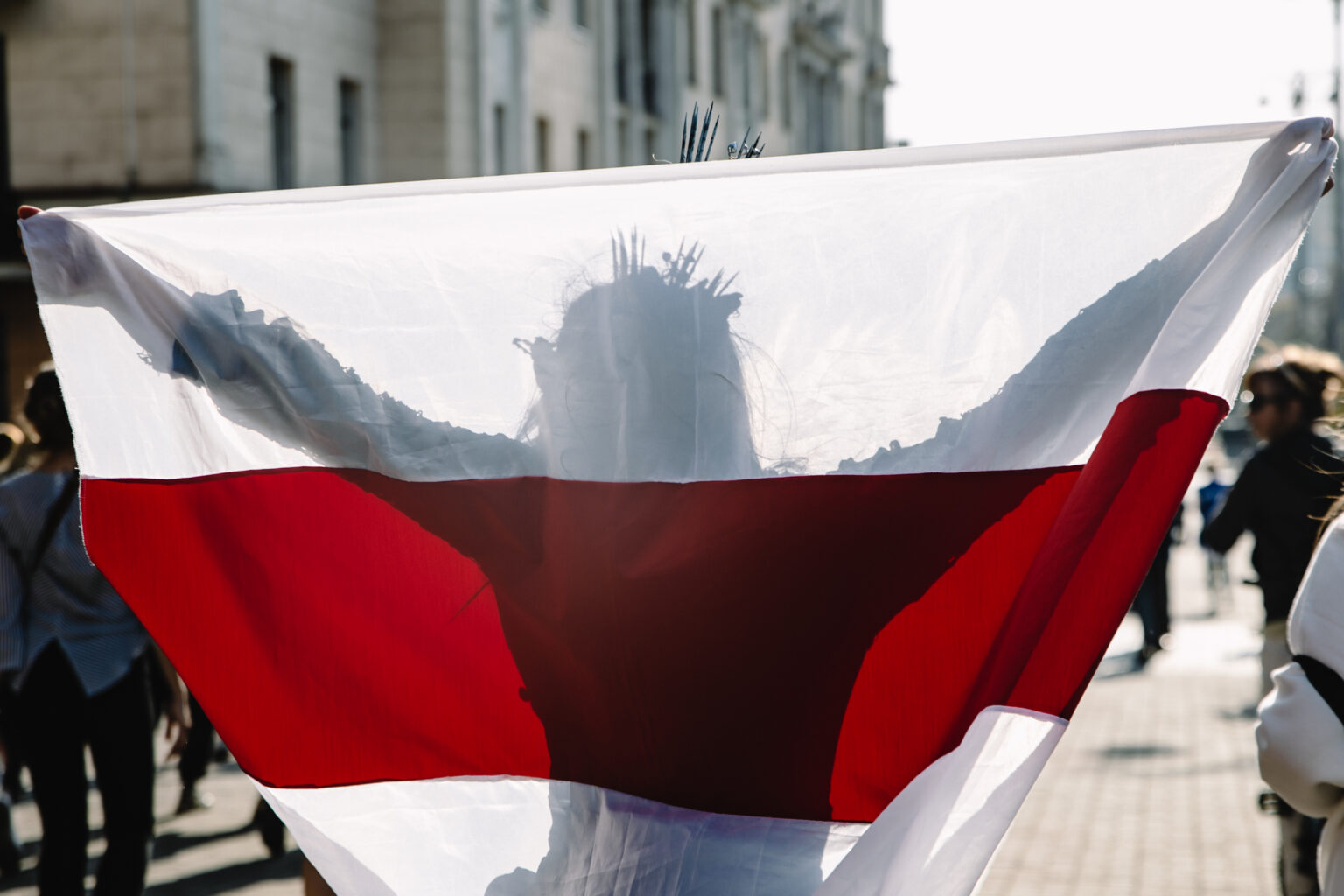
EPILOGUE
2021 The Year of The Defeat of the Media, forced relocation and Rising of Journalism from the Ashes
Last year the independent media in Belarus faced unprecedented repression. As a result of hundreds of searches and dozens of criminal cases, the majority of independent media outlets were smashed and closed. Over three dozen of our colleagues were forced into captivity and around 300 journalists had to leave Belarus.
Leading independent publications in the country have been declared extremist. This means that one can get a prison sentence simply for cooperation with the media and even for sharing a link with friends and family. The past year is best illustrated by the door to Radio Liberty’s office in Minsk, that was blown up by security forces during a search on the 16th of July 2021. Three of the paper’s staff are now in captivity and approximately another 23 journalists too.
But even after such a devastating campaign independent media have found the strength to resume their work. Hundreds of journalists, fleeing criminal prosecution, have gone abroad to restart their media outlets. Without the arrested editors. In difficult conditions and without access to the scene. With destroyed financial models and with physically and psychologically damaged reporters.
But Belarusian journalism lives on. Today it is published from Minsk, Warsaw, Vilnius, Tbilisi and many other cities and countries. People who have lost their home and have had to rebuild their lives. Yet they make heroic efforts to create truthful journalism of high quality and bring it to their audience despite bans and blockades.
We continue to believe that all this is not in vain and that one day we will be able to return to our homes. Unlike the security forces journalists do not use guns, handcuffs, stun guns or rubber truncheons. Our main strength is the truth and solidarity.
With deep respect and gratitude,
Barys Haretski, BAJ Deputy Chairman.
REPORTS WITHOUT BORDERS SWEDEN’S RECOMMENDATIONS
TO THE AUTHORITIES:
- Residence permit
Assist the journalists in the process of applying for visas and residence permits in the country of exile and let the asylum process be permeated by speed. - Psychological support
Offer psychological and medical help.
TO ORGANISATIONS:
- Legal help
Offer legal assistance to journalists affected by prosecutions, fines and ongoing legal proceedings in their home country. - Financial help
Assist the journalists financially and compensate for such things as loss of income, increased costs in connection with the escape and confiscated equipment. Also support the Belarusian newsrooms that have moved their operations abroad.
THE JOURNALISTS WISHES:
- SUPPORT BAJ
Assist the Belarusian Association of Journalists, which was dissolved by the Belarusian authorities and whose members are now spread around the world, to continue its work for independent journalists in the country and in exile. - Political pressure
Grasp every opportunity to urge the Belarusian regime to stop harassing and imprisoning journalists. All political prisoners must be released and freedom of the press in Belarus must be restored. - Do not forget Belarus!
Never forget the journalists who are imprisoned or facing long prison sentences in Belarus. Tell the world about them, write letters to them and say their names out loud at international meetings, within the trade union movement and in the newsrooms.
PERSONS INTERVIEWED FOR THIS REPORT:
Iryna Arakhovskaya, freelance journalist.
Aliaksandra Dynko, correspondent/Radio Liberty.
Maria Gritz, reporter Belsat News.
Tanya Kapitonova, photographer and journalist.
Ruslan Kulevich, journalist.
Hanna Liubakova, journalist and expert, Atlantic Council.
Natallia Lubneuskaja, reporter at newspaper Nasha Niva.
Zmicier Mickiewicz, reporter, Belsat TV.
Anton Trafimovich, freelance journalist
Alexander Yaroshevich, Belarusian Investigative Center.
Vadim Zamirovski, photojournalist.
Anonymous journalist.
Pictures in the report: Violetta Savchits och Tanya Kapitonova
 @bajmedia
@bajmedia
